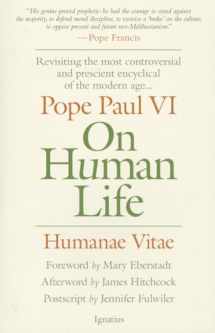
On Human Life: Humanae Vitae
Book details
Summary
Description
On Human Life, also known by the Latin name Humanae Vitae, made headlines worldwide. Everybody talked about the document when it was issued in 1968 but few people actually read. It is perhaps the most controversial document in modern Church history. Why?
The advent of the birth control pill left many moralists wondering: could its use be reconciled with the two-thousand-year-old Christian teaching against contraception? After years of study and despite widespread expectations otherwise, the Catholic Church rejected the pill, as it had other forms of contraception, as contrary to God's purpose and therefore as harmful to genuine human good.
On Human Life: Humanae Vitae is Pope Paul VI's explanation of why the Catholic Church rejects contraception. Paul VI referred to two aspects or "meanings" of human sexuality-the unitive and procreative aspects. Neither the person-uniting aspect (the unitive meaning) nor the person-begetting aspect (procreative meaning) may deliberately be separated from the other in the act of sexual intercourse, argued Paul VI, without acting against God's purpose and damaging the conjugal relationship.
Paul VI also warned of the consequences if contraception became widely practiced-consequences that have since come to pass: greater infidelity in marriage, confusion regarding the nature of human sexuality and its role in society, the objectification of women for sexual pleasure, compulsory "family planning" and contraceptive policies by government, and the reduction of the human body as an instrument of human manipulation. Other dangers such as genetic engineering and human cloning are on the horizon.
Greeted by a firestorm of opposition, On Human Life: Humanae Vitae greatly shaped debates in the Catholic Church. A movement of dissent emerged. While some Catholic leaders and others openly rejected Catholic teaching, others reaffirmed it and even developed it. St. John Paul II's popular "theology of the body" drew deeply on the insights of Paul VI. Pope Benedict and now Pope Francis have upheld the long-standing teaching. Indeed, a new generation of Catholics are embracing the truths of On Human Life: Humanae Vitae.
"[Pope Paul VI's] genius proved prophetic: he had the courage to stand against the majority, to defend moral discipline, to exercise a ‘brake' on the culture, to oppose [both] present and future neo-Malthusianism."
- Pope Francis


We would LOVE it if you could help us and other readers by reviewing the book
Book review



